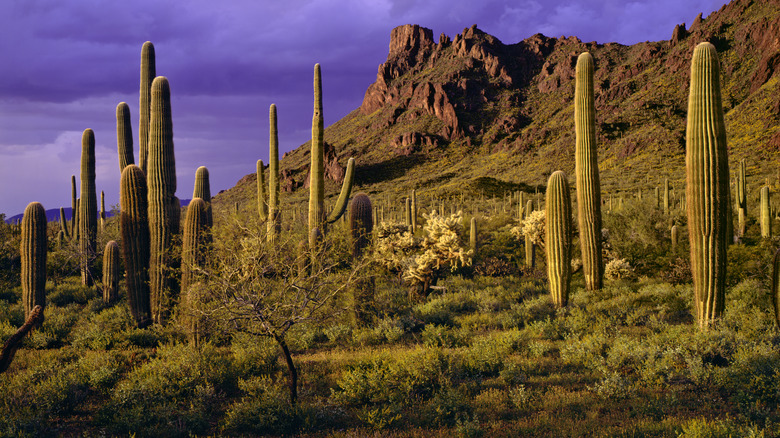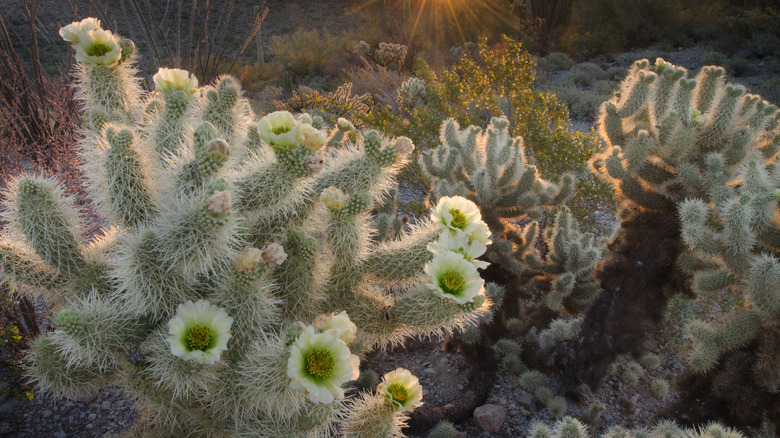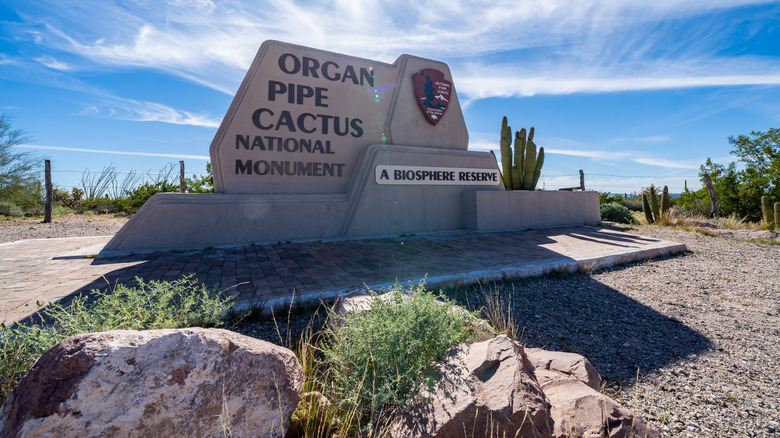This US National Monument Is Just As Dangerous As It Is Gorgeous
The state of Arizona is synonymous with extreme heat and desert landscapes. One of the most beautiful is none other than the Sonoran Desert, home to Organ Pipe Cactus National Monument. Located in Ajo, Organ Pipe Cactus National Monument is about two hours from Phoenix, Arizona's capital. President Franklin D. Roosevelt first established Organ Pipe Cactus in 1937, and it has since become a biosphere reserve known for its diverse flora and fauna, including the eponymous organ pipe cactus. Moreover, the 516 square mile area has more than 28 miles of trails, making it a nature lover and hiker's paradise.
However, Organ Pipe Cactus has a dark past. It's situated right on the U.S.-Mexico Border, and at one point, it was laden with drug smuggling, cartel activity, and violence. This led it to be dubbed the most dangerous national park in the country. Tragedy struck in 2002 when 28-year-old park ranger Kris Eggle was murdered at Organ Pipe Cactus by cartel members fleeing Mexico, and shortly after, 70% of Organ Pipe Cactus was closed to the public, states High Country News. After beefing up border security, it fully opened in 2014. A few years later, in 2019, the border wall was controversially expanded by then-President Donald Trump. Although visitors to the park no longer have to worry about cartels, there are other perils to be wary of.
Safety tips for Organ Pipe Cactus National Monument
First and foremost, visitors to Organ Pipe Cactus National Monument should be aware of its scorching heat. From April to September, temperatures during the day are over 100 degrees Fahrenheit, per the National Park Service, so drinking and bringing plenty of extra water and electrolytes is recommended to prevent dehydration. The weather is also no joke. Due to its proximity to the U.S.-Mexico Border, the park is a hot spot for migrants, and unfortunately, many of them have died in Organ Pipe Cactus from heat-related illnesses.
While exploring, you want to ensure you don't break any cactus rules. According to NPS History, you can find 28 different species of cacti in Organ Pipe Cactus. However, if you get too close, you risk the spines of certain cacti, such as the cholla cactus (pictured), painfully embedding into your skin, clothes, and even shoes. For this reason, you want to ensure that you have tweezers or pliers on hand during a visit to the park. If an accident happens, these tools can pull out the cacti's spines. The same can be said about white glue and gauze. Place the gauze where the spines are and add glue. Once dry, you can peel off the glue, which will subsequently remove the spines.
Like any nature-filled area, Organ Pipe Cactus is home to various animals, including bighorn sheep, javelinas, mountain lions, bobcats, snakes, and more. If you encounter any of these, keep your distance to prevent the animal from feeling threatened and possibly attacking.
Activities at Organ Pipe Cactus National Monument
If safety hazards haven't deterred you from visiting Organ Pipe Cactus National Monument, know that an entrance pass is required and can be purchased online. Prices range from $15 to $25. When you arrive at the park, make sure to stop by the Kris Eggle Visitor Center. It's open seven days a week from 9 a.m. to 5 p.m. You'll find park rangers, restrooms, snacks, wi-fi, and more. As mentioned, there are various hiking trails at Organ Pipe Cactus.
This includes the 5-mile Victoria Mine Trail, which is top-rated on All Trails. Here, hikers can explore the remnants of a former successful mine from the 1800s. While leashed pets are allowed, they are prohibited from all hiking trails except for three: the Palo Verde trail, the Campground Perimeter trail, and the Visitor Center nature trail. This is to keep them safe from wildlife.
Looking for something else to do besides hiking? There's plenty. You can take a scenic 2-hour, 21-mile drive through Ajo Mountain, where visitors will encounter the park's natural beauty and famed organ pipe cacti. Alternatively, you could bike on this same road. Likewise, camping is allowed at Organ Pipe Cactus. Visitors will find RV and tent sites, restrooms, and showers at the Twin Peaks Campground. Camping fees range from $10 to $50, and keep in mind that there are no hookups. While this is a bare-bones camping experience, the silver lining is that campers will get optimal views of the sky and the stars.


